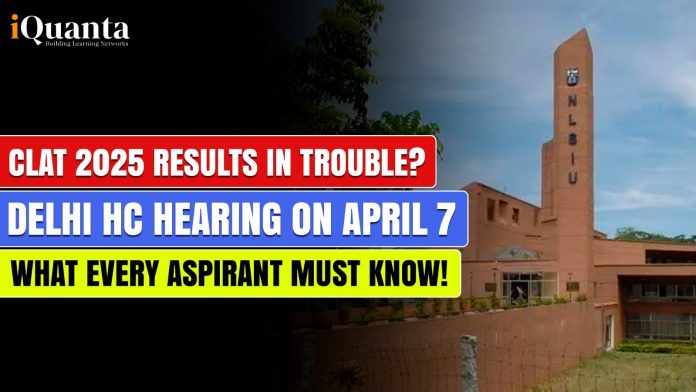The Common Law Admission Test (CLAT) serves as the gateway for aspiring law students to secure admissions into prestigious National Law Universities (NLUs) across India. The 2025 edition of the test, which was held in December 2024, has been plagued with controversies, subjecting it to legal disputes and increased anxiety levels among the contestants. This article explores the series of events, judicial interventions, and the prevailing status of CLAT 2025 results.

Initial Discrepancies and Legal Challenges
Soon after the CLAT 2025 exam, discrepancies were noticed in the answer key, specifically in questions 14 and 100 of Set A. Due to these mistakes, the candidates started making allegations that the same could affect their rankings and the consequent admissions. One such candidate, Aditya Singh, approached the Delhi High Court with a petition challenging the answer key’s validity.
Delhi High Court’s Intervention
On December 20, 2024, the Delhi High Court recognized the mistakes made in the answer key and ordered the Consortium of National Law Universities (CNLU) to update the CLAT 2025 results accordingly. The court specifically pointed out that these errors may have a material impact on the merit list and candidate rankings and highlighted the urgency for immediate and equitable corrections so that no injustice is caused to the aspirants.
Consortium’s Response and Further Legal Proceedings
In respect of the court’s order, the CNLU started the procedure to revise the results. The Consortium, nonetheless, moved an appeal against the order of the single judge, requesting a stay on the revision of the results. A division bench of the Delhi High Court, consisting of Acting Chief Justice Vibhu Bakhru and Justice Tushar Rao Gedela, considered the appeal and confirmed the findings of the single judge. The bench explained that there was no ground to suspend the results and cleared their announcement, saying, “We clarify that there is no stay order & pendency of this petition is not construed as placing a cloud on the results, which may be reworked as per the single judge order.”
Transfer of Petitions to Delhi High Court
In view of the plethora of petitions filed in multiple high courts contesting the results of CLAT 2025, the Supreme Court stepped in to facilitate uniform adjudication. On February 6, 2025, the top court directed all such petitions to be transferred to the Delhi High Court. A bench headed by Chief Justice Sanjiv Khanna ordered these petitions to be heard by a division bench of the Delhi High Court on March 3, 2025. The Supreme Court also ordered the registrars of the respective high courts to shift the judicial records of pending cases to the Delhi High Court.
March 3, 2025: Delhi High Court Hearing
On March 3, 2025, the Delhi High Court had a short hearing on the CLAT 2025 case. The division bench of Chief Justice Devendra Kumar Upadhyay and Justice Tushar Rao Gedela heard the matter of urgency, recognizing the students’ anxiety over the uncertainty that has prevailed. Chief Justice Upadhyay said, “There is a lot of nervousness among students. Their board exams are on. They are very young. Due to this uncertainty, it is creating a lot of stress among students…We want to pass an order just to make it easier how smoothly we can begin.”
Key Directives of the Hearing
Directions issued by the court during hearing on few points to expedite the process include:
- Appointment of Nodal Lawyers: Under-graduate (UG)-programmes have two nodal lawyers put in place by the court-for one-writer to consolidate discrepancies, replies and all related judgments, one such appointment is for another post-graduate (PG) programme.
- CNLU: A period of two weeks was given to the CNLU to file their response: against the CLAT 2025 results petition.
- Rejoinder of Petitioner: The petitioners’ rejoinder will be ten days after the file by the Consortium.
- Convenience Compilation: A complete compilation of all the documents and judgments relevant to the case will be made to facilitate smooth proceedings.
Next Hearing Scheduled:
The court has provisionally fixed the next hearing for April 7, 2025. The bench underscored the need to settle the issue at the earliest to remove the stress and anxiety of the students. The Chief Justice underlined the necessity of ensuring a smooth process, given the current board examinations and the youth of the candidates concerned.
Impact on Students and Admission Process
The continuing legal cases have created a situation of uncertainty among CLAT 2025 applicants. The delay in announcing the results has pushed back the counselling and admission procedures for several NLUs, further aggravating the anxiety faced by the applicants. The court recognition of this worry further emphasizes the need to end the disputes so that the students are able to continue with their studies without any further disruption.

Conclusion
The CLAT 2025 test has faced tremendous setbacks from variations in the answer key, and there have been legal interventions, with delays in the admissions process. The proactive move by the Delhi High Court in tackling such matters speaks volumes about the court’s eagerness to maintain fairness and transparency in the evaluation process. As the next hearing date looms near, the stakeholders continue to harbor hope for an expeditious resolution that will enable the students to proceed with their legal education process without more uncertainty.




